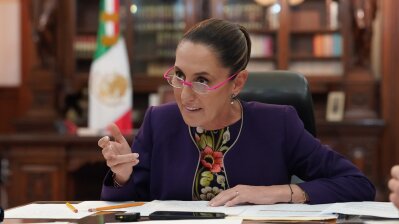Argentina's State Intelligence Secretariat (SIDE) has approved a National Intelligence Plan that could permit agents to gather intelligence on journalists, economists, academics, and other government critics, investigative journalist Hugo Alconada Mon reported in La Nación.
The 170-page document, designed in late 2024 under SIDE director Sergio Neiffert, contains "generalisations, grey areas and ambiguities" that would allow the targeting of anyone who "erodes" public trust in security officials or "generates loss of trust" in government economic policies, according to Alconada Mon's report.
The plan reportedly fails to distinguish between foreign intelligence threats and legitimate critics, including press members and subject experts who may "manipulate" public opinion or spread "disinformation" during elections.
President Javier Milei's communications office denied the accusations. However, hours after publication, Milei posted on X that "Journalism (90%) [are] the biggest creators of fake news in the history of mankind," echoing anti-press sentiments of US President Donald Trump.
Following his report, Alconada Mon said unidentified hackers attempted to compromise his WhatsApp account ten times and his X account once.
This controversy highlights growing tensions between the Milei administration and media critics, raising concerns about press freedom and government surveillance capabilities. Last year, Milei restructured Argentina's state news agency, Télam, into an advertising agency, triggering widespread protests by media workers.
The intelligence plan emerges amid a broader campaign by Milei against Argentina's media establishment, just as the country grapples with economic challenges that have intensified political polarisation. The libertarian president has increasingly targeted journalists under the slogan "People don't hate journalists enough", whilst his cabinet members have followed suit with similar statements.
Economy Minister Luis Caputo recently claimed that journalism "is a profession that tends to disappear", whilst presidential adviser Santiago Caputo has been accused of intimidating photographers covering political events. This rhetoric has coincided with a dramatic increase in physical attacks on journalists, including recent incidents where reporters covering pensioner protests have been struck by tear gas canisters and threatened by unidentified assailants.
The escalation in anti-media rhetoric marks a stark departure from Milei's previously symbiotic relationship with the Argentine press. Before assuming the presidency, the flamboyant libertarian built his political career through frequent appearances on television and radio programmes, deftly leveraging media exposure to secure first a congressional seat and later the Casa Rosada. But since taking office, Milei has severely restricted media access, granting interviews almost exclusively under tightly controlled conditions from the presidential palace.
Meanwhile, the Argentine Journalism Forum has warned of "an escalation of attacks on journalists promoted by the country's highest authority", noting a 53% increase in press attacks in 2024 compared to the previous year, with digital harassment accounting for nearly half of all incidents.
And NGO Reporters Without Borders (RSF) delivered a scathing assessment in its latest report, warning that “In Argentina, President Javier Milei stigmatised journalists, dismantled public media outlets, and used state advertising as a political weapon,” the report states.
The South American nation has tumbled 47 places to 87th out of 180 countries in RSF's annual press freedom ranking since Milei assumed the presidency in December 2023.
News

Colombia's Álvaro Uribe sentenced to 12 years house arrest
Former Colombian President Álvaro Uribe Vélez was sentenced to 12 years house arrest for procedural fraud and bribery in criminal proceedings.

Trump orders nuclear submarine deployment amid escalating dispute with Russia's Medvedev
US President Donald Trump ordered the deployment of two nuclear submarines following an escalating social media confrontation with Russia's number two.

If Kyiv doesn't want to deal with Moscow yet, Russia can wait, Putin says
Russian President Vladimir Putin said Moscow is prepared to wait if Kyiv believes it is not yet time to engage in negotiations, stating that Russia can be patient regarding the settlement process in Ukraine.

Saudi Flynas expects to carry tourists first on flights to Russia
Saudi Arabian airline Flynas expects to carry primarily tourists on flights to Russia, with the carrier planning to increase frequencies to several Russian regions.

.jpg)

